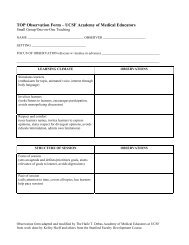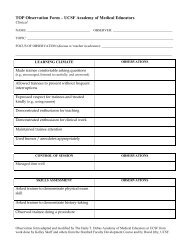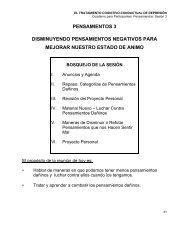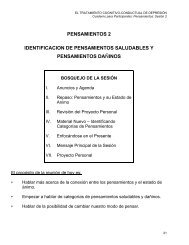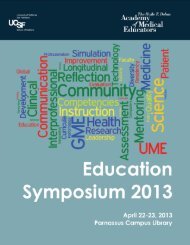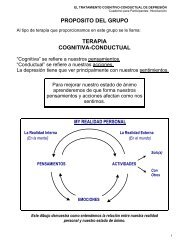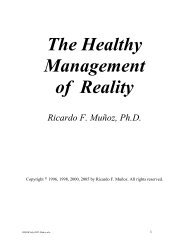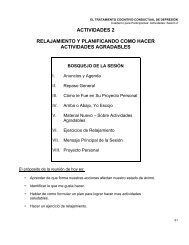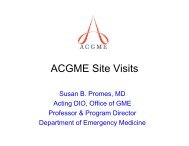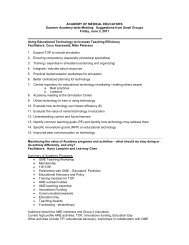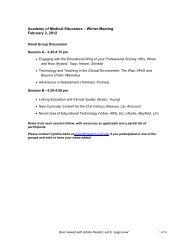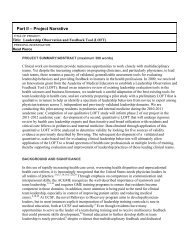2011 - UCSF School of Medicine - University of California, San ...
2011 - UCSF School of Medicine - University of California, San ...
2011 - UCSF School of Medicine - University of California, San ...
You also want an ePaper? Increase the reach of your titles
YUMPU automatically turns print PDFs into web optimized ePapers that Google loves.
<strong>UCSF</strong> Education Day <strong>2011</strong>Curriculum Development PostersAdventures in Competency-BasedFormative Assessment: FacultyDevelopment to Provide Feedback onCritical ReflectionsLouise Aronson, MD, MFA, <strong>UCSF</strong> Department <strong>of</strong><strong>Medicine</strong>, Division <strong>of</strong> Geriatrics,aronsonl@medicine.ucsf.edu; Susan Masters, PhD,<strong>UCSF</strong>, Department <strong>of</strong> Cellular and MolecularPharmacology, masters@cmp.ucsf.edu; Lowell Tong,MD, USCF, Department <strong>of</strong> Psychiatry; Kevin Mack,<strong>UCSF</strong>, Department <strong>of</strong> Psychiatry; Carol A. Miller, <strong>UCSF</strong>,Department <strong>of</strong> Pediatrics; Heidi Kirsch, MD, <strong>UCSF</strong>,Department <strong>of</strong> Neurology; Marieke Kruidering, PhD,<strong>UCSF</strong>, Department <strong>of</strong> Cellular and MolecularPharmacology, Marieke.Kruidering@ucsf.eduAreas abstract covers: UMEDomain(s) addressed: Faculty Development,Feedback, Portfolios, ReflectionPurpose: To develop and assess a volunteer effort toprovide feedback on reflective skills in medical studentcritical reflections.Background: Literature suggests that reflectionimproves pr<strong>of</strong>essional behavior, teamwork, selfmonitoring,and clinical performance. Reflective skilldevelopment requires repeated practice with timelyfeedback. As medical schools increasingly incorporatereflection into their curricula, they must devise means <strong>of</strong>providing feedback to large numbers <strong>of</strong> learners onexercises that can be assessed for both reflective skilland reflective learning about a specified topic.Methods: A series <strong>of</strong> competency-based, formativeexercises were added across the first-year corecurriculum and linked to the MD Portfolio. We recruitedfaculty and staff to a feedback team via targeted emailsand announcements at curricular committee andAcademy meetings. A 1.5-hour-long training introducedvolunteer reviewers to critical reflection using theLEAP/SOAP model and related feedback guidelines andhad participants practice writing feedback on reflectiveskill development for several de-identified reflectionsamples. RESULTSThe initial call yielded 8 volunteers.A repeat call yielded 4 more. The feedback team <strong>of</strong> 9faculty from 8 departments and 3 educational staffprovided feedback on 456 reflections from September toDecember, 2010. To protect student privacy, reviewerscould not see previous reflections or feedback. Onaverage, faculty provided feedback on 3-5 reflections perweek, which delayed the feedback to students for up to4-6 weeks.Evaluation Plan: Reviewers will complete a surveyabout the experience and their feedback approach. Arater will score the quality <strong>of</strong> feedback in a random subsampleusing qualitative analysis and a feedback rubric.We will compare results from the first and thirdreflections and analyze relevant data from longitudinalstudent focus groups and course evaluations.Dissemination: ECC meetings; Education Day, WGEA,national meetings.Reflective critique: We will use the evaluationinformation to revise next year’s critical reflectioncurriculum.References:1. <strong>San</strong>dars, John. The use <strong>of</strong> reflection in medical education: AMEEGuide No. 44, Medical Teacher, 31: 8, 685 -695, 2009.Continuous Improvement DuringThird-Year ClerkshipsVanja Douglas, MD, <strong>UCSF</strong>, vanja.douglas@ucsf.edu;Joseph Liu, BA, <strong>UCSF</strong> <strong>School</strong> <strong>of</strong> <strong>Medicine</strong>,joseph.liu@ucsf.edu; Heidi Kirsch, MD, <strong>UCSF</strong>,heidi.kirsch@ucsf.edu; Ann Poncelet, MD, <strong>UCSF</strong>,ann.poncelet@ucsf.edu; S. Andrew Josephson, MD,<strong>UCSF</strong>, ajosephson@memory.ucsf.eduAreas abstract covers: UMEDomain(s) addressed: Curricular Innovation, FeedbackPurpose: To develop a web-based interface that allowsstudents and educators to evaluate each other dailyduring clinical rotations.Background: Feedback is an important yet <strong>of</strong>tenneglected part <strong>of</strong> the learning process. Quality toolsbased on the principles <strong>of</strong> Continuous Improvement (CI)provide a medium for effective and immediate feedback.Methods: We developed an online CI module in theCollaborative Learning Environment through whicheducators and students can provide each other dailyfeedback. Over one year, two instructors on an inpatientneurology clerkship were assigned to use the modulewith their third-year students (10 students) and the restattended as usual (7 students). Students completed asurvey about feedback after their rotation. Instructorsusing the module were interviewed. The Wilcoxon ranksumtest was used to compare Likert scales.16 The Haile T. Debas Academy <strong>of</strong> Medical Educators



